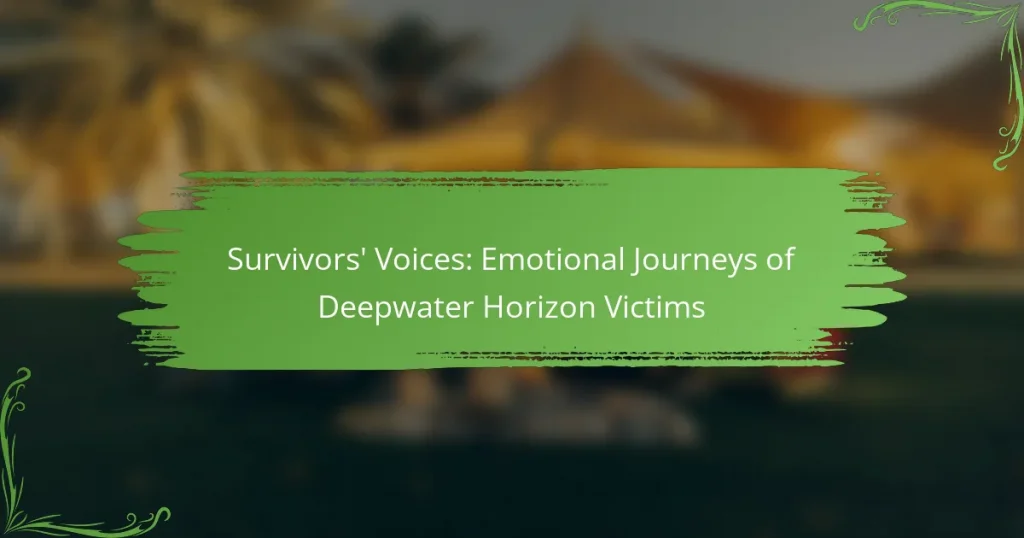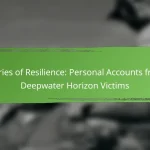The Deepwater Horizon disaster significantly impacted the lives of its survivors, leading to profound emotional journeys characterized by trauma, grief, and resilience. Victims faced acute stress, anxiety, and long-term psychological effects such as depression and post-traumatic stress disorder (PTSD) following the catastrophic event on April 20, 2010. Personal accounts reveal experiences of fear, loss, and the struggle for recovery, highlighting the need for support resources. Various organizations, including the Gulf Coast Claims Facility and the Substance Abuse and Mental Health Services Administration, offer assistance to help survivors navigate their ongoing emotional challenges and rebuild their lives.
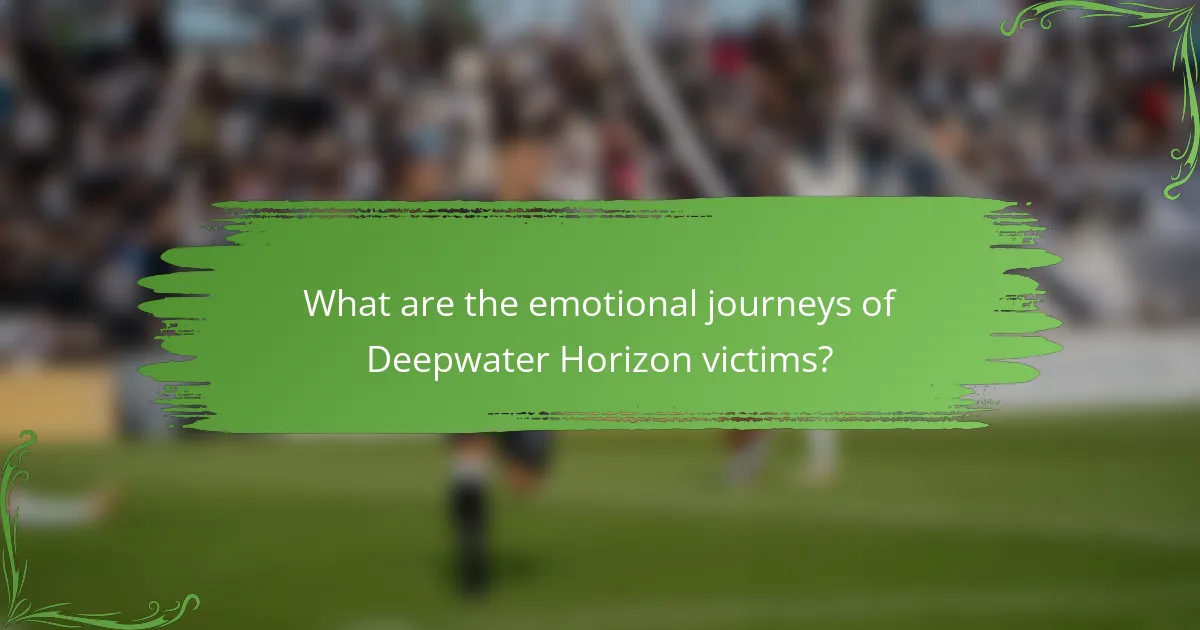
What are the emotional journeys of Deepwater Horizon victims?
The emotional journeys of Deepwater Horizon victims encompass trauma, grief, and resilience. Survivors experienced acute stress and anxiety immediately following the disaster. Many faced the loss of loved ones and livelihoods. The psychological impact included depression and post-traumatic stress disorder (PTSD). Long-term effects involved ongoing emotional struggles and community displacement. Victims often sought support through counseling and peer groups. Their journeys reflect a complex interplay of loss and recovery. Research indicates that emotional recovery varies significantly among individuals, influenced by personal and social factors.
How did the Deepwater Horizon disaster impact survivors emotionally?
The Deepwater Horizon disaster significantly impacted survivors emotionally. Many experienced intense feelings of anxiety and depression following the event. Survivors reported persistent nightmares and flashbacks related to the disaster. Studies indicate that the trauma led to increased rates of post-traumatic stress disorder (PTSD) among those affected. The loss of livelihoods and community support exacerbated these emotional struggles. Survivors also faced challenges in coping with grief over lost colleagues and the environmental devastation. Research shows that emotional support and counseling were crucial for many in their recovery process. Overall, the emotional toll of the disaster was profound and long-lasting for the survivors.
What immediate emotional responses did survivors experience after the disaster?
Survivors of the Deepwater Horizon disaster experienced immediate emotional responses of shock, fear, and anxiety. Many reported feeling overwhelmed by the suddenness of the event. Grief was common as survivors mourned losses, including loved ones and livelihoods. Anger towards the situation and those responsible for the disaster was prevalent. Confusion about the future and the impact on their lives contributed to their emotional turmoil. These responses were documented in various survivor accounts and psychological assessments conducted in the aftermath of the disaster.
How did the long-term emotional effects manifest for these individuals?
Long-term emotional effects for individuals affected by the Deepwater Horizon disaster manifested as persistent anxiety and depression. Many survivors reported feelings of helplessness and loss of control over their lives. Emotional distress often led to strained relationships with family and friends. Some individuals experienced symptoms of post-traumatic stress disorder (PTSD), including flashbacks and nightmares. A study indicated that around 30% of those affected showed signs of clinical anxiety or depression years after the incident. The economic impact of the disaster exacerbated these emotional struggles, leading to financial instability and further mental health challenges. Survivors also described a deep sense of grief for lost livelihoods and community ties.
What coping mechanisms did survivors employ?
Survivors employed various coping mechanisms to manage their emotional distress. Common strategies included seeking social support from family and friends. Many survivors participated in support groups to share experiences and emotions. Some individuals utilized mindfulness and meditation techniques to reduce anxiety. Others engaged in physical activities like exercise to improve their mental well-being. Creative outlets, such as art and writing, were also used to express feelings. Research shows that these mechanisms can enhance resilience and facilitate recovery. Studies indicate that social connections are vital for emotional healing after traumatic events.
How did survivors seek support from family and friends?
Survivors sought support from family and friends through open communication and sharing their experiences. They often expressed their feelings and challenges to loved ones. This helped them feel understood and less isolated. Many survivors participated in support groups that included family members. These groups facilitated discussions about shared experiences and coping strategies. Friends provided emotional support by listening and offering reassurance. Survivors also relied on practical help from family, such as assistance with daily tasks. This combination of emotional and practical support was crucial for their recovery.
What role did community resources play in their emotional recovery?
Community resources played a crucial role in the emotional recovery of Deepwater Horizon victims. These resources provided essential support systems, including counseling services and peer support groups. Access to mental health professionals helped individuals process their trauma effectively. Community organizations facilitated workshops that promoted resilience and coping strategies. Additionally, social connections fostered a sense of belonging and reduced feelings of isolation. Studies indicate that social support significantly enhances emotional well-being during recovery phases. Victims reported feeling more empowered and hopeful through community engagement. Overall, community resources were integral to rebuilding emotional stability post-disaster.
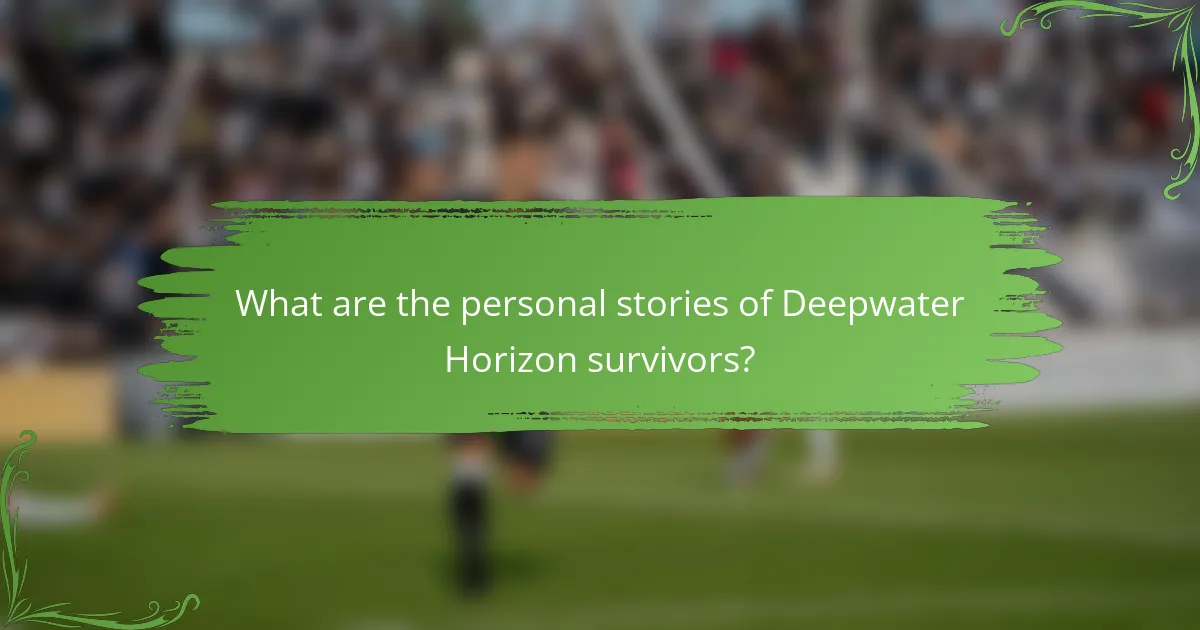
What are the personal stories of Deepwater Horizon survivors?
Survivors of the Deepwater Horizon disaster share harrowing personal stories of their experiences. Many recount moments of fear and uncertainty during the explosion on April 20, 2010. Some survivors describe the chaos as they evacuated the rig, feeling the heat and hearing the sounds of destruction. Others highlight the emotional toll of witnessing colleagues injured or lost.
One survivor, Mike Williams, detailed his escape and the desperate attempts to save others. He later shared how the event affected his mental health and relationships. Another survivor, Andrea Fleytas, spoke about the trauma and the long-lasting impact on her life.
These narratives reveal the profound psychological effects of the disaster. Survivors often struggle with PTSD and survivor’s guilt. Their stories emphasize the need for support and resources for those affected by such tragedies. The Deepwater Horizon incident remains a significant event in maritime history, with lasting implications for safety and regulation in the industry.
How do individual narratives illustrate the emotional impact of the disaster?
Individual narratives illustrate the emotional impact of the disaster by providing personal accounts of loss and trauma. Survivors often describe feelings of grief, anger, and helplessness. These stories reveal the psychological toll of the Deepwater Horizon disaster. For instance, many individuals recount the devastation of losing livelihoods and homes. Emotional responses are often tied to specific events during and after the disaster. Narratives highlight the struggle to cope with ongoing anxiety and depression. They also reflect on the community’s collective trauma and resilience. Research indicates that storytelling can foster healing and connection among survivors. Such narratives serve as powerful tools for understanding the human experience behind the statistics.
What common themes emerge from survivor testimonies?
Common themes in survivor testimonies include resilience, trauma, and community support. Survivors often express resilience in overcoming adversity. Many describe the emotional and psychological trauma they experienced. Feelings of loss and grief are frequently mentioned. Survivors also highlight the importance of community support during recovery. They recount how connections with others helped them cope. The testimonies reveal a shared journey of healing and hope. These themes reflect the complex emotional landscape following the Deepwater Horizon disaster.
How have these stories contributed to public awareness of the disaster’s effects?
Survivors’ stories from the Deepwater Horizon disaster have significantly raised public awareness of its effects. These narratives provide personal insights into the emotional and physical toll of the disaster. They highlight the long-term psychological impacts on victims and their families. Media coverage of these stories has amplified their reach, engaging broader audiences. Research indicates that personal testimonies can evoke empathy and drive public interest in environmental issues. For instance, a study by the American Psychological Association found that storytelling can enhance understanding of complex social issues. The emotional weight of these accounts fosters a deeper connection to the disaster’s consequences. Overall, survivors’ voices serve as powerful tools in educating the public about the lasting impacts of the Deepwater Horizon disaster.
What challenges do survivors face in sharing their experiences?
Survivors face significant challenges in sharing their experiences. Emotional trauma often hinders their willingness to speak out. Many survivors grapple with feelings of shame and guilt related to their experiences. Fear of judgment from others can also inhibit open communication. Additionally, survivors may struggle with recalling traumatic events, causing anxiety during sharing. The lack of supportive environments can further complicate their efforts. Research indicates that stigma surrounding their experiences can lead to isolation. These factors collectively create barriers that make it difficult for survivors to share their stories.
How do stigma and societal perceptions affect survivor narratives?
Stigma and societal perceptions significantly shape survivor narratives. Survivors often face judgment based on preconceived notions about their experiences. This judgment can lead to feelings of isolation and shame. For instance, research shows that societal attitudes towards environmental disasters can influence how victims are perceived. Survivors may be viewed as less credible or overreacting. This perception can hinder their ability to share their stories effectively. Moreover, stigma can discourage survivors from seeking support. Studies indicate that negative societal views often amplify the trauma experienced by survivors. Ultimately, stigma and perceptions can distort the narrative, affecting healing and recovery.
What barriers exist for survivors in accessing mental health support?
Survivors face multiple barriers in accessing mental health support. Stigma surrounding mental health issues often prevents individuals from seeking help. Financial constraints can limit access to necessary resources. Availability of services may be inadequate in certain geographical areas. Lack of awareness about available mental health services contributes to underutilization. Cultural differences may hinder effective communication between survivors and mental health providers. Fear of judgment can discourage survivors from disclosing their experiences. Additionally, past negative experiences with healthcare systems can create distrust. These barriers significantly impact the ability of survivors to receive the mental health support they need.
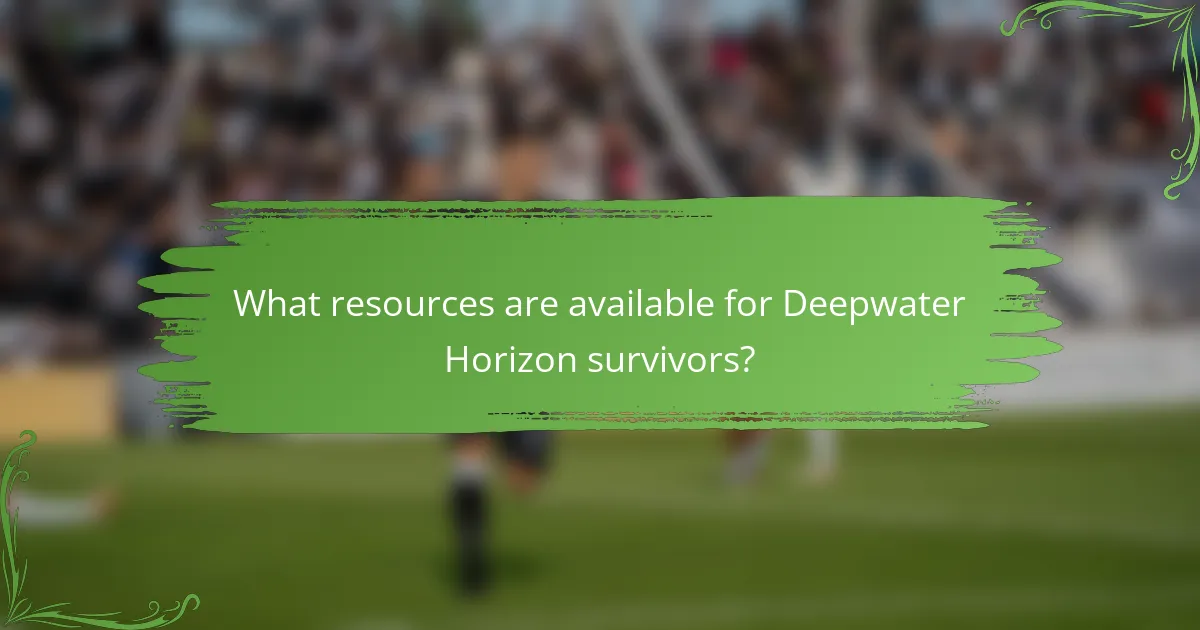
What resources are available for Deepwater Horizon survivors?
Deepwater Horizon survivors have access to various resources for support and recovery. The Gulf Coast Claims Facility provides financial assistance to individuals affected by the disaster. The National Institute for Occupational Safety and Health offers health resources and information regarding occupational safety. Local community organizations also provide psychological support and counseling services. The Deepwater Horizon Oil Spill Trust Fund assists with environmental restoration and economic recovery efforts. Additionally, the Substance Abuse and Mental Health Services Administration offers resources for mental health support. These resources aim to aid survivors in their recovery journey following the disaster.
How can survivors access mental health services tailored to their needs?
Survivors can access mental health services tailored to their needs through specialized support programs. These programs often provide trauma-informed care that addresses the unique experiences of survivors. Many organizations focus on the mental health impacts of environmental disasters, such as the Deepwater Horizon spill. Survivors can reach out to local mental health providers who understand the specific challenges they face. Additionally, community health centers may offer resources and referrals for mental health services. Online platforms can also provide access to therapists with experience in trauma care. Research indicates that personalized mental health services significantly improve recovery outcomes for survivors.
What types of therapy are most effective for disaster survivors?
Cognitive Behavioral Therapy (CBT) and Eye Movement Desensitization and Reprocessing (EMDR) are most effective for disaster survivors. CBT helps individuals process trauma by changing negative thought patterns. EMDR facilitates the integration of traumatic memories through guided eye movements. Studies indicate that CBT reduces symptoms of PTSD in disaster survivors by 60-80%. Research shows that EMDR can lead to significant improvements in trauma-related symptoms within fewer sessions compared to traditional therapies. Both therapies are evidence-based and widely recommended by mental health organizations for treating trauma.
How can support groups facilitate healing for these individuals?
Support groups can facilitate healing for survivors of the Deepwater Horizon disaster by providing emotional support and a sense of community. These groups create a safe space for individuals to share their experiences and feelings. Sharing personal stories can reduce feelings of isolation and validate emotions. Participants often find comfort in knowing others have similar experiences. Support groups can also offer coping strategies and resources for managing trauma. Research indicates that social support is crucial for recovery from traumatic events. A study published in the Journal of Traumatic Stress found that peer support significantly improves psychological outcomes for trauma survivors. Thus, support groups play a vital role in the healing process for these individuals.
What practical steps can survivors take to aid their emotional recovery?
Survivors can take several practical steps to aid their emotional recovery. Engaging in therapy can provide professional support and coping strategies. Joining support groups allows survivors to connect with others who share similar experiences. Practicing mindfulness and meditation can help reduce anxiety and improve emotional regulation. Establishing a routine can create a sense of normalcy and stability. Physical activity, such as walking or yoga, can boost mood and overall well-being. Journaling can serve as a therapeutic outlet for processing emotions. Seeking social support from friends and family can enhance feelings of connection and understanding. Lastly, setting small, achievable goals can foster a sense of accomplishment and progress in recovery.
How can mindfulness and self-care practices benefit survivors?
Mindfulness and self-care practices can significantly benefit survivors by promoting emotional healing and resilience. These practices help survivors manage stress and anxiety, which are common after traumatic experiences. Mindfulness encourages present-moment awareness, allowing individuals to process their emotions without judgment. Research shows that mindfulness can reduce symptoms of PTSD, enhancing overall mental well-being. Self-care practices, such as exercise and journaling, foster a sense of control and self-empowerment. Engaging in these activities can improve mood and increase feelings of safety. Together, mindfulness and self-care create a supportive framework for survivors to navigate their emotional journeys.
What role does advocacy play in supporting the emotional journeys of survivors?
Advocacy plays a crucial role in supporting the emotional journeys of survivors. It provides a platform for survivors to share their experiences and validate their feelings. Advocacy efforts often include mental health resources, which are essential for emotional healing. Support groups facilitated by advocacy organizations foster community and connection among survivors. Research shows that survivors who engage with advocacy programs report lower levels of anxiety and depression. Advocacy also raises awareness about the unique challenges faced by survivors, leading to increased public support. This public support can lead to policy changes that benefit survivors’ mental health needs. Overall, advocacy empowers survivors and aids in their emotional recovery.
Survivors’ Voices: Emotional Journeys of Deepwater Horizon Victims focuses on the psychological impact experienced by individuals affected by the Deepwater Horizon disaster. The article explores the immediate emotional responses, long-term effects, and coping mechanisms of survivors, highlighting the significance of community support and mental health resources in their recovery. Personal narratives illustrate the trauma, resilience, and challenges faced by victims, while discussing barriers to accessing mental health services and the role of advocacy in their emotional healing. Key themes include the interplay of grief, loss, and recovery, emphasizing the need for comprehensive support systems for those impacted by such disasters.
